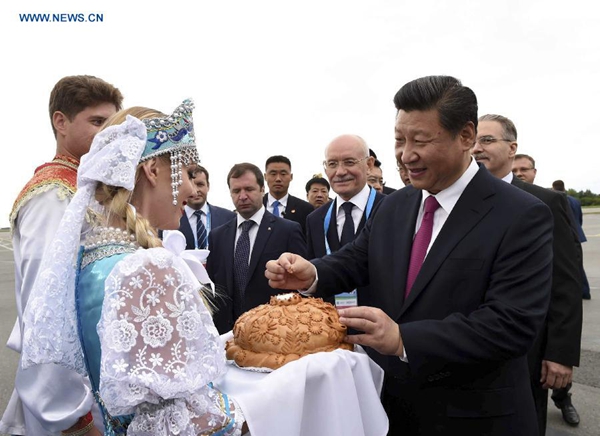The SCO's Ufa summit
- By Sajjad Malik
 0 Comment(s)
0 Comment(s) Print
Print E-mail China.org.cn, July 9, 2015
E-mail China.org.cn, July 9, 2015
|
|
|
Chinese President Xi Jinping (R, front) tastes bread presented by Russian young people when he arrives in Ufa, Russia, July 8, 2015, to attend the 7th leaders' meeting of BRICS and the 15th meeting of the Shanghai Cooperation Organization (SCO) Council of Heads of State. [Xinhua/Rao Aimin] |
The 15th summit of the Shanghai Cooperation Organization is being held on July 9 and 10 in the Russian city of Ufa. The organization, which was set up in 2001, has come a long way since its inception as a regional grouping to forge closer security, military, economic, financial and cultural cooperation among its members. In addition to other activities, the SCO has also been active in combating the three evils of "extremism, separatism and terrorism" under the aegis of its Shanghai Convention of 2001.
The major achievement of the group is its success in maintaining peace and stability within the member states at a critical juncture in history, when several nations are being torn apart by anti-human forces of extremism and militancy. The creation of the SCO coincided with the Sept. 11 attacks and the United States-led NATO forces' attack on Afghanistan. The expulsion of the Taliban and their al-Qaida allies in 2001 posed a major threat to Afghanistan's neighbors. It was rightly feared that extremists would try to create safe havens and inspire sympathizers among the Muslims of Central Asia, China, Russia and other countries that border Afghanistan.
Nations like Pakistan fell prey to legions of militants who spawned mayhem. According to official data, more than 55,000 people have been killed in Pakistan, and the country's economy has suffered a colossal loss of over 100 billion dollars since the invasion of Afghanistan. The SCO club of nations largely remained safe from the physical and ideological intrusions of al-Qaida and its affiliates. There have been some exceptions; attacks occurred inside China and Russia, and some Central Asian countries were threatened, but all these nations succeeded in warding off the beast of extremism.
In my mind, this is the most important achievement of the SCO nations. It is time to highlight the role of the SCO mechanism in combating the three evils mentioned above, and its lessons should be shared with other countries that suffer from the scourge of militancy.
The 15th summit is also remarkable for another reason, as its members are expected to ratify the SCO Development Strategy for the next decade, which ends in 2025. An important element of the organization's future plan may be the possible expansion of the group to include some of its observer states, which are currently Afghanistan, India, Iran, Mongolia and Pakistan. India and Pakistan are the strongest candidates for inclusion in the SCO. The process of assigning full membership status to observer states will be completed by next year and will be an important step for regional peace and stability.
Both India and Pakistan are nuclear countries and harbor a long-standing enmity over the Himalayan region of Kashmir. Both also share a key border with China. Traditionally, Pakistan has had close ties with China, while India has been aligned with Russia. In recent years, however, Pakistan and Russia have drawn closer to each other, while India and China have become close trading partners. Both Pakistan and India have close links with the Central Asian nations that are already part of the SCO.
India and Pakistan are also closely linked with the Western world and Muslim nations, and their inclusion in the SCO will not only add to the physical and geographical dimensions of the group but will also bring new value to the group's strategic aspects. The inclusion of India and Pakistan would help address fears that the SCO has been evolving into a counterforce against NATO.
Pakistan and India's possible accession to full SCO membership would also improve bilateral relations between the two countries, which have fought three major wars against each other and have been involved in several border flare-ups. Being part of the SCO would bring pressure onto the two countries to set aside some of their differences. This would also have a calming impact on their rivalry in Afghanistan and would thus strengthen regional peace.
The Ufa summit provides an opportunity to review the SCO's achievements and make plans to grapple with future challenges. The summit's primary goals should be to achieve internal peace within and among member states and to improve collective efforts to make borders peaceful. In this way, the SCO's ability to maintain the cross-border stability of its members will increase. It will bring the region closer together, thereby promoting its economic development and further enhancing its international image as an organization committed to peace and development.
The writer is a columnist with China.org.cn. For more information please visit: http://www.china.org.cn/opinion/SajjadMalik.htm
Opinion articles reflect the views of their authors, not necessarily those of China.org.cn







Go to Forum >>0 Comment(s)